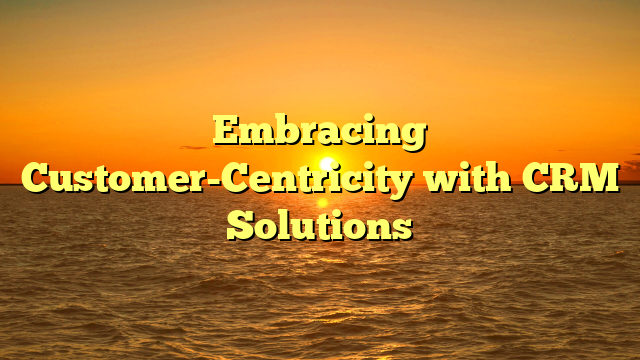In today’s hyper-connected and competitive business landscape, customers have become more demanding than ever before. They expect personalized experiences, prompt responses, and exceptional service from the companies they interact with. To meet these expectations and thrive in the market, businesses must adopt a customer-centric approach. Customer relationship management (CRM) solutions play a pivotal role in helping businesses embrace customer-centricity and create meaningful and lasting relationships with their customers.
The Shift Towards Customer-Centricity
In the past, businesses were primarily product-focused, concentrating on designing and manufacturing products to meet market demands. However, with the rise of the internet and social media, the power dynamic shifted in favor of customers. They gained access to an abundance of information, allowing them to research and compare products and services easily. As a result, businesses had to adapt and become customer-centric to stay competitive.
Customer-centricity is a strategy that places the customer at the core of all business decisions and actions. It involves understanding customer needs, preferences, and pain points and tailoring products, services, and interactions accordingly. A customer-centric approach goes beyond one-off transactions; it focuses on building long-term relationships with customers and delivering exceptional experiences throughout their journey with the brand.
The Role of CRM Solutions
CRM solutions provide businesses with the tools and capabilities needed to adopt a customer-centric approach. These platforms act as a central repository of customer data, enabling businesses to gather, store, and analyze customer information from various touchpoints. Here’s how CRM solutions support customer-centricity:
1. Comprehensive Customer Profiles:
CRM solutions create comprehensive customer profiles by aggregating data from multiple sources, such as purchase history, social media interactions, customer service inquiries, and website behavior. These profiles offer businesses a holistic view of each customer, facilitating personalized and relevant engagements.
2. Personalized Communications:
With customer data at their fingertips, businesses can personalize their communications with customers. Whether it’s an email, a phone call, or a marketing campaign, CRM solutions allow businesses to tailor their messages based on customer preferences, interests, and buying behavior.
3. Seamless Customer Service:
CRM platforms empower customer service teams to provide seamless and efficient support. Customer service representatives have access to historical interactions and previous issues, enabling them to offer timely and informed resolutions to customer inquiries.
4. Predictive Analytics:
Many CRM solutions come equipped with predictive analytics capabilities. By analyzing historical data, CRM systems can identify patterns and trends that help businesses anticipate customer needs and preferences. This insight enables businesses to offer proactive solutions and recommendations to customers.
5. Streamlined Sales Processes:
CRM solutions streamline sales processes by automating tasks, tracking leads, and providing insights into customer behavior. Sales teams can prioritize leads and tailor their sales pitches based on customer profiles, increasing the chances of closing deals.
6. Customer Segmentation:
CRM platforms allow businesses to segment their customer base based on various criteria, such as demographics, buying behavior, and interests. This segmentation enables targeted marketing campaigns and personalized offers for different customer groups.
Conclusion
Embracing customer-centricity is no longer an option but a business imperative. Customers expect personalized experiences and interactions, and CRM solutions offer businesses the means to meet these expectations. By leveraging customer data, providing personalized communications, and delivering exceptional customer service, businesses can foster lasting relationships with their customers and thrive in today’s customer-driven market.
